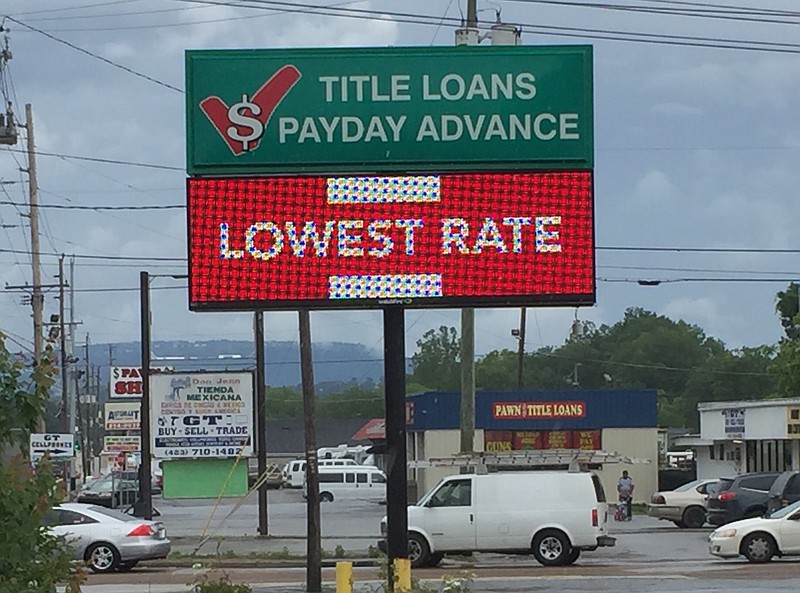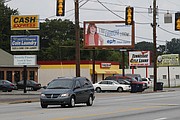In the shadow of where some of America's biggest payday lenders began and created hundreds of millions of dollars in area wealth, Chattanoogans concerned about the toll such loans are taking on individuals and the community gathered Monday night to talk about new ways to regulate the industry and provide better alternatives.
In a new assessment of short-term payday loans, the Chattanooga Mayor's Council on Women said such loans cost borrowers too much, are too frequently rolled over and often hurt, rather than help, consumers meet their budget needs.
Chattanooga City Councilwoman Carol Berz, chair of the Mayor's Women's Council, called the 460 percent annual interest charge allowed in Tennessee for payday loans "ridiculous" and a contributor to Tennessee's status as the top state in the country again this year for the rate of personal bankruptcies.
State law allows payday lenders to charge rates far in excess of what is allowed for military personnel under federal law and the less restrictive rules for lenders in the Volunteer State helped make the use of such loans in Tennessee one of the highest rates in the country, Berz said.
By the numbers
In Hamilton County there are currently:› 36 check cashers - including 24 in the city of Chattanooga,› 46 title pledge lenders - including 27 in the city of Chattanooga,› 49 deferred presentment services, or payday lenders - including 28 in the city of Chattanooga.Source: The Tennessee Department of Financial Institutions
"People get trapped," Berz said, "and too many people are using payday loans not for emergencies but for ongoing living expenses."
Chattanooga Mayor Andy Berke, a former state senator, said the payday lending industry "has tremendous influence" in the Tennessee General Assembly. Two years ago, Chattanooga adopted limits on the clustering of payday lenders under city zoning rules to restrict new payday lending sites within a half mile of each other or within 500 feet of a residence.
But during a gathering of more than 100 members and supporters of the Mayor's Women's Council in Brainerd, many suggested the city should do more by alerting borrowers to the problems with payday loans on business signs and urged Tennessee's legislature to follow Georgia, North Carolina and other states that have set stricter usury limits on what lenders may charge.
"There is not a lobby for citizens," Berke said during the seminar for those concerned about payday lending in Chattanooga. "We want to make sure that people speak up and let their voice be heard and that people are aware of how these loans can hurt individuals, families and neighborhoods."
Payday lenders, however, insist they provide a valuable and needed service to provide credit for consumers who might otherwise not be able to secure short-term loans for emergencies or unexpected medical or other expenses.
"Payday loans are a very useful and popular tool for consumers," said Wayne "Jabo" Covert, senior vice president of government affairs for the Cleveland, Tenn.-based Check Into Cash. "When faced with cash shortfalls, many consumers face limited options where they can borrow $300 until payday."
About 12 million Americans use payday loans, or 5.5 percent of all persons in the past five years. Two of the nation's biggest privately owned payday lenders were started in Cleveland, Tenn., and their fortunes have helped University of Tennessee athletics, among other local causes.
The late Steve "Toby" McKenzie made a fortune in the 1990s by building one of the first payday lending chains Check Advance, before selling the business in 1999 to Advance America and pursuing nearly 100 other business ventures while donating millions of dollars to area schools, including a gift to the University of Tennessee at Chattanooga to pay off the debt on the roundhouse, which was then renamed the McKenzie Arena in his honor.
An even bigger fortune has been made by Allan Jones, who started Check Into Cash in 1993 and built the payday lending business into the largest privately held chain of payday lending stores in the country.
A new study by the University of Tennessee at Chattanooga Solution Scholars class found Tennesseans are disproportionately using payday loans. In states with most stringiest regulation 2.9 percent of adults use loans, compared to 6.6 percent in the least regulated states like Tennessee.
"We cannot afford for our current trends to continue," the class report concluded.
But Covert said conventional banks won't offer small unsecured loans for a week or two and payday loans are cheaper than bounced check fees.
"If a customer is facing multiple bounced check fees, over-the-limit charges on a credit card or other financial penalties they will always take the cheaper option of using payday advance to cover their short term needs," he said.
North Carolina effectively shut down most brick-and-mortar payday lending outlets with its regulations, but the state is now one of the highest volume online payday lending states in the country. The Consumer Financial Protection Bureau is drafting federal rules to regulate payday lenders, but President Donald Trump and others are urging that the law that created the CFPB, the Dodd-Frank consumer protection act, should be repealed because of the extra costs it imposes on lenders and other financial institutions.
A study by the New York Federal Reserve a decade ago found that without payday loans in Georgia and North Carolina more people bounced checks and paid hefty penalties as a result.
"Payday credit, as expensive as it is, is still cheaper than a close substitute: bounced check "protection" sold by credit unions and banks," the study's author, Donald Morgan, concluded in the 2007 Fed study.
Tracy Smith, community development manager for First Tennessee Bank, said conventional banks are closely regulated and need borrowers to do more to build and improve their credit history and ratings. First Tennessee's Operation Hope and the Money School and other programs by Chattanooga Neighborhood Enterprises help borrowers learn and improve their credit scores.
"We want to reduce the number of people using high-interest loans and increase te number of community members that have access to traditional financial services," said Jennifer Harper, founder and director at Bridge Financial Planning, LLC and one of the authors of the critical study on the local payday lending business.
The average user of payday loans takes out eight loans a year and the average loan amount is $375 with an average annual interest total of $520.
Census data shows Chattanooga has one payday lending store for about every 1,500 households - one of the highest rates in the country.
The UTC study found most payday lenders in Hamilton County are in areas where household income is below average and along CARTA bus routes, which are more frequently used by low income persons.
Contact Dave Flessner at dflessner@timesfreepress.com or at 423-757-6340.

